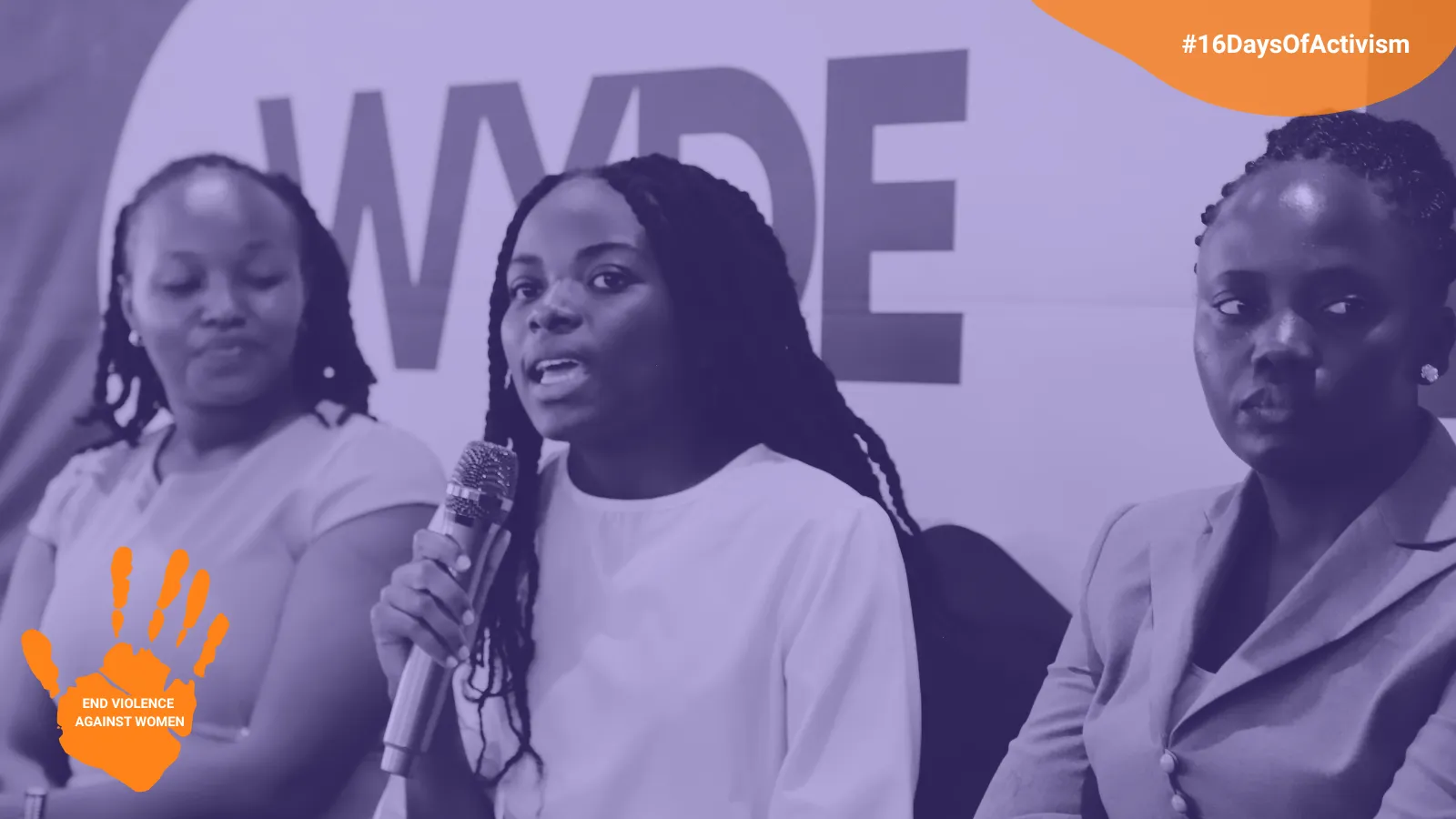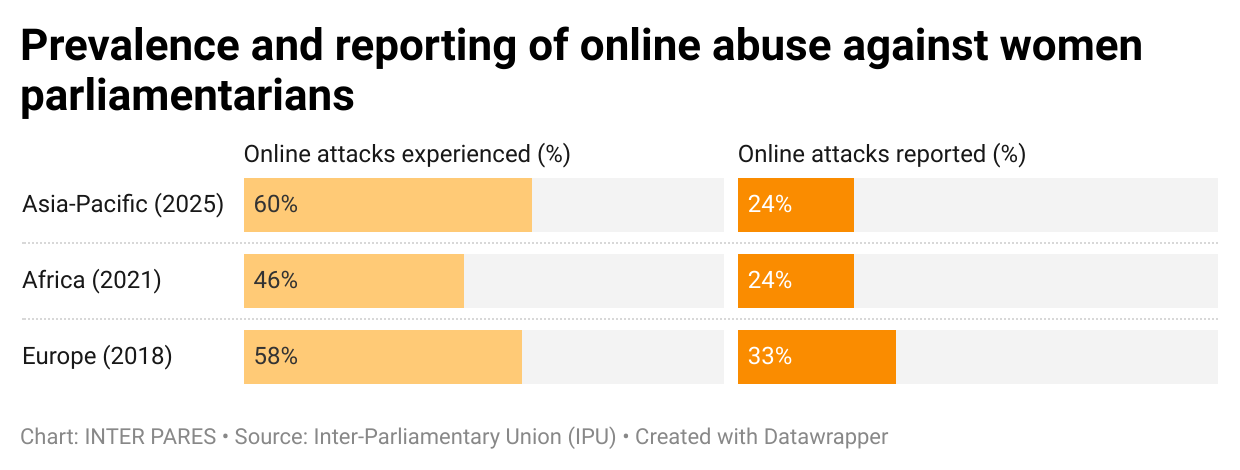Violence against women in the digital space: A growing threat to democracy

Opinions expressed in this commentary are those of the authors and do not necessarily represent the institutional position of International IDEA, its Board of Advisers or its Council of Member States.
The inability to curb online violence not only impacts electoral integrity but also our democratic systems, by limiting equal participation and representation for women and marginalized groups.
The digital landscape presents distinct challenges in safeguarding the right to non-discrimination, such as algorithmic bias, digital profiling, online harassment and unequal access to digital resources. Digital Violence Against Women in Politics (VAWP) is increasingly common, with those from marginalized groups facing the highest levels of violence. Online ‘attacks against female politicians tend to revolve around fabricated personal misconduct, which fuels objectification, reinforces harmful stereotypes and undermines women’s credibility’. As highlighted in a recent webinar on iKNOW Politics, this form of digital violence discourages women from engaging fully in politics and frequently leads to self-censorship.
According to a report by International IDEA on Rights in the Digital Age, approximately 44 per cent of 133 AI systems analyzed exhibited gender bias, while 25 per cent demonstrated both gender and racial bias.
Rising threat of violence in a rapidly digitalizing world
Digital violence manifests itself in many forms, including harassment, cyberstalking, gendered disinformation, AI-generated abuse such as deepfakes, and doxxing, threats, and coordinated trolling. These tactics draw strength from deeply entrenched gender norms and power imbalances, which shape who is targeted, how they are attacked, and why such abuse is normalized. Because digital tools make violence cheaper, faster, more anonymous, and infinitely scalable, powerful mechanism for silencing women’s voices and policing their visibility in public life.
This is not only a gender-equality concern but a profound democratic issue as the online is an extension of the offline. When women face relentless online abuse, they are deterred from speaking, participating, or running for office; gendered disinformation distorts political debate; threats and deepfakes undermine the fairness of electoral competition; and the failure to hold perpetrators accountable erodes trust in institutions.

Digital violence against women is not merely an online problem. It is a structural threat to democratic participation, representation, and legitimacy itself.
Illustrative cases: Silencing women in politics through TFGBV
In Sweden, Anna-Karin Hatt, former Minister for Digital Development described in 2025 how online hate amplified anti-immigrant extremism and disproportionately targeted women leaders, ultimately contributing to her decision to resign from government. In Pakistan, sexually explicit deepfake of Punjab Information Minister Azma Bokhari circulated rapidly in December 2024, forcing her to temporarily withdraw from public life. She later sought legal redress, calling for stronger cybercrime laws and accountability mechanisms.
A powerful example from South Africa shows how digital abuse within political parties tests internal accountability. Precious Banda, President of the Young Women of Africa, faced cyberbullying from a male ANC politician, publicly called out the perpetrator and succeeded in having all abusive posts removed.
In the Netherlands, Deputy Prime Minister Sigrid Kaag resigned in 2023 after years of online hate and intimidation. It was a decision that had a chilling effect on emerging women leaders, many of whom began to question not only whether to enter politics but whether they could safely remain visible in public life. Together, these cases illustrate how digital violence is global and is undermining not only individual women but the democratic institutions and processes that depend on women’s participation and representation.
Way forward: What needs to be done?
As we mark the 16 Days of Activism Against Gender-Based Violence, it is crucial to recognize that the fight for gender equality and eradication of violence against women is deeply interconnected. At the core of the issue lie harmful gender social norms that perpetuate violence against women and prevent accountability for perpetrators of violence by normalizing such acts.
There can be progress. The Democracy Tracker dataset highlights significant milestones achieved in 2025, showcasing how progress in women’s political leadership, economic empowerment, and legal reforms can serve as powerful tools to combat gender-based violence (GBV) by challenging set stereotypes around gender roles.
Inter Pares highlights concrete actions parliaments can take: making the issue visible, strengthening laws and policies, overseeing their implementation, and make institutions safer. To tackle a growing wave of online abuse, the Scottish Parliament introduced a social media monitoring service for Members. In the first 10 months, it flagged thousands of abusive online comments and referred 461 potentially criminal threats to police. One abuser has already been prosecuted as a result.
A report from the iKNOW Politics Webinar highlights that electoral commissions must build awareness among their staff of the digital threats confronting women in political spaces, work closely with civil society and political parties to understand these challenges, and advocate for policy reforms that strengthen online protections. Political parties, as the primary gatekeepers to elected office, need to adopt clear policies and accountability mechanisms to support and safeguard female candidates, including publicly condemning online abuse and disciplining perpetrators within their ranks. Civil society plays an essential role in pushing both parties and electoral bodies toward stronger support systems and in promoting gender-responsive digital literacy initiatives. At the same time, digital platforms must implement and enforce gender-sensitive community standards to ensure safer online environments for women in politics.
International IDEA – A partner in combatting digital VAWP
Through initiatives such as WYDE (Women and Youth Democratic Engagement) Women's Leadership Initiative, International IDEA supports intersectional ecosystem analyses, intergenerational exchanges with political leaders, empowerment programmes for young women, and global knowledge-sharing platforms such as the iKNOW Politics focusing on social norm change to enhance women’s political participation and representation. International IDEA’s work on gender-sensitive parliaments through Inter Pares encourages parliaments to take action on VAWP by developing international practices outlined in the Beyond Numbers: stories of gender equality in and through parliaments publication.
International IDEA also supports electoral management bodies and other electoral stakeholders by building knowledge and capacity to recognize, prevent, and respond to risks and challenges related to gender-based violence in elections. Through research, guidance, and targeted training delivered under the Protecting Elections project and other initiatives, International IDEA helps create safer, more inclusive electoral environments where women can participate and lead without fear or discrimination.
Conclusion: A call to action
As we mark the 16 Days of Activism, we must recognize that protecting women’s voices online is essential for safeguarding democracy itself. Digital spaces must be places where women can participate fully, freely, and safely. Ending digital violence is not only a gender-equality imperative it is a democratic necessity.
International IDEA remains committed to working with partners across the world to ensure that the digital future is safe, inclusive, and democratic for all.



